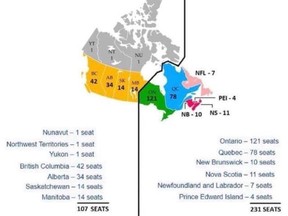Tom Mueller: Regional seat map makes good sense
In the arena of politics solutions are always compromises

Article content
Every 10 years, the number of seats allotted to each province and territory in the House of Common is redistributed according to a complicated formula detailed in Canada’s Electoral Boundaries Readjustment Act. A simmering discontent with this process finds expression through online memes.
One such pictorial grievance, entitled “Until this changes – Nothing changes,” starkly displays the arithmetic of disenchantment: Western provinces and territories are allotted 107 parliamentary seats, versus the 231 lavished upon Ontario, Quebec and the Atlantic provinces.
Another meme contrasts Atlantic Canada with Alberta. The former, with a population of 2.41 million, is blessed with 32 seats in the Commons. Alberta has almost twice the population at 4.36 million, but somehow only garners an extra two seats in parliament, at 34. Little wonder some Westerners feel hard done by.
Here’s the rub: The regional distribution of seats according to population would not really put the West much further ahead. Yet it would certainly strain what vestiges of Canadian unity still remain when conjuring the ghost of the failed Meech Lake Accord.
From a prairie perspective, nothing would be gained; in fact, if we had strict “rep by pop,” the Prairie provinces combined could lose a seat (with Alberta gaining as many as Manitoba and Saskatchewan lose). British Columbia’s lotus-eating electorate, who tend to dance to a different political tune than their cowboy-hat-wearing neighbours, would gain four.
There are at least 20 major distinct Aboriginal groups across our three territories., who differ more from each other linguistically and culturally than English-Canada does from French-Canada. Currently, the Northwest Territories, Yukon, and Nunavut have one seat apiece. A system of equal populations per seat would reduce their combined representation to just one seat. First Nations, Inuit and Métis of Canada’s North would consider themselves effectively disenfranchised.
Seat redistribution would vex Atlantic Canada the most! The 32 seats our region currently holds would dwindle by a third to 22, with Prince Edward Island hit the hardest by losing three of its four seats. Ontario becomes the bloated pachyderm in the Canadian parlour, gaining an extra 10 seats and growing.
Then there is Quebec. It may be politically incorrect and Euro-centric to observe that French Canada was originally regarded an equal partner upon our dominion’s formation. Yet Quebec would drop one seat to 77 as the thin edge of a pernicious wedge, as their representation dwindles in tandem with the march of time. Eventually, the rest of Canada could consider the concerns of the belle province as incidental.
In sum, our system is not perfect. But in the arena of politics, where solutions are always compromises, Canada has presciently dodged ‘Tyranny of the Majority.’ Let’s keep it that way.
Tom Mueller is a former biomedical researcher, retired teacher and columnist for Brunswick News











Postmedia is committed to maintaining a lively but civil forum for discussion. Please keep comments relevant and respectful. Comments may take up to an hour to appear on the site. You will receive an email if there is a reply to your comment, an update to a thread you follow or if a user you follow comments. Visit our Community Guidelines for more information.